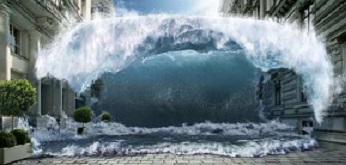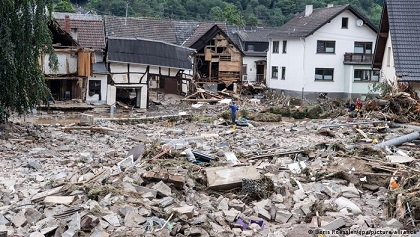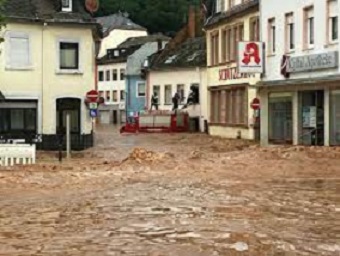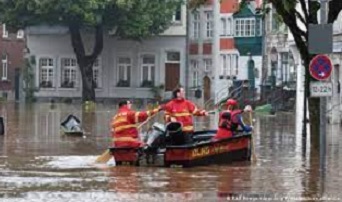PASAULIS: GEOPOLITINĖS GRIMASOS / APŽVALGOS / GAMTA
МИР: ГЕОПОЛИТИЧЕСКИЕ ГРИМАСЫ / ОБОЗРЕНИЕ / ПРИРОДА
WORLD: GEOPOLITICAL GRIMACES / REVIEWS / NATURE

СТРАНИЦА / PAGE 504/655
♦♦
BMJ „DOVANOS“ VASARĄ
2021 LXXI
«ПОДАРКИ» БМБ ЛЕТОМ 2021
LXXI
WMB „GIFTS“ IN SUMMER
2021 LXXI
Informacijos šaltinis/Источник инфармации/Information source: interneto erdvė/ пространство интернета/internet space
Portale paskelbta/Oпубликовано в портале/Published on the portal: 2021 – 07- 19 / 19 – 07 – 2021
♦♦
I. Mokslininkai perspėja apie katastrofiškus potvynius ateityje
Meteorologai teigia, kad pasaulinė klimato kaita per ateinančius dešimtmečius išprovokuos dar didesnį kritulių kiekį. Tai globalinio atšilimo atsakomybė.

Andreasas Finkas iš Karlsrūės technologijos instituto Meteorologijos ir klimato tyrimų instituto įsitikinęs, kad gamtos reiškiniai, analogiški katastrofiškam potvyniui Vokietijoje, taps vis dažnesni ir labiau įprasti.
„Šiltuose kraštuose lietaus bus daugiau“, – sako jis.
Dr. Sebastianas Sippelis iš Ciuricho atmosferos ir klimato mokslų instituto teigia, kad atmosferos pokyčiai, kuriuos sukelia visuotinis atšilimas, yra viena iš stiprių lūčių priežasčių.
„Temperatūrai pakilus vienu laipsniu Celsijaus, atmosfera gali sugerti apie 7% daugiau drėgmės.
Dėl globalaus atšilimo sukeltas papildomas drėgnumas ilgainiui padidina kritulių kiekį“, – aiškina meteorologas.
Priminsime, jog keletos dienų laikotarpyje, pradedant nuo praėjusio pirmadienio, Vokietijos vakaruose ir pietvakariuose buvo liūtys, kurios sukėlė niokojantį potvynį. Dėl smarkaus lietaus Reino Ahro ir Mozelio intakai, taip pat mažos upės Sauer, Prüm, Niems, Kiel ir Erft išsiliejo iš krantų. Stichija smogė Reino-Vestfalijos ir Reino krašto-Pfalco federalinės žemėms.
II. Apie potvynį Vokietijoje
Vokietijos kanclerė Angela Merkel potvynių padėtį šalyje pavadino bauginančia ir pridūrė, kad vokiečių kalboje nėra žodžių, apibūdinančių šios stichijos padarytus sugriovimus.

Ji tai pareiškė liepos 18 d., sekmadienį, per spaudos konferenciją šalies vakaruose esančiame Adenau mieste.
„Tai siaubinga. Noriu pasakyti, kad vokiečių kalba kažin ar žodžius, apibūdinančius padarytus sugriovimus “, – pasakė A. Merkel.
Reino krašto-Pfalco ministrė pirmininkė Malu Dreyer per spaudos konferenciją pareiškė, jog dingusiųjų be žinios paieška tęsiama. Anot jos, „daugelio“ Ahrweiler rajono gyventojų, kuris nuo stichijos nukentėjo labiausiai, dar nerasta.
Primename, kad dėl didžiausio per 50 metų potvynio Vakarų Europoje, naujausiais duomenimis, Vokietijoje žuvo 170 žmonių ir mažiausiai 670 nukentėjo. Dėl liūčių Reino intakai – Aras ir Mozelis, taip pat mažos upės – Erftas, Zaueris, Priumas, Nimsas, Kylis išsiliejo iš krantų.
Tad regiono infrastruktūra patyrė didelę žalą. Kaimyninės Belgijos valdžia pranešė apie 27 skenduolius. Austriją, Šveicariją, Liuksemburgą ir Nyderlandus taip pat plovė gausios liūtys.


♦♦
I. Учёные предупреждают о катастрофических наводнениях в будущем
Метеорологи утверждают, что в ближайшие десятилетия глобальные изменения климата спровоцируют дальнейший экстремальный рост количества осадков. Виной всему глобальное потепление.

Андреас Финк из Института метеорологии и климатических исследований Технологического института Карлсруэ убежден, что природные явления, подобные катастрофическому наводнению в Германии, будут случаться все чаще и станут привычными.
«Экстремальные дожди будут идти чаще в теплом мире», — говорит он.
Доктор Себастьян Сиппель из Института атмосферных и климатических наук в Цюрихе утверждает, что одной из причин сильных ливней являются изменения в атмосфере, вызываемые глобальным потеплением.
«При повышении температуры на один градус Цельсия атмосфера может поглощать примерно на 7% больше влаги.
Дополнительная влажность, вызванная глобальным потеплением, приводит к увеличению количества осадков в долгосрочной перспективе», — поясняет метеоролог.
Напомним, в течение нескольких дней, начиная с минувшего понедельника, на западе и юго-западе Германии шли ливни, которые стали причиной разрушительного наводнения. Из-за дождей из берегов вышли притоки Рейна Ар и Мозель, а также небольшие реки Зауэр, Прюм, Нимс, Киль и Эрфт. Под ударом стихии оказались федеральные земли Северный Рейн — Вестфалия и Рейнланд-Пфальц.
II. O наводнении в Германии
Канцлер Германии Ангела Меркель назвала пугающей ситуацию с наводнениями в стране, , добавив, что в немецком языке нет слов, при помощи которых можно было бы описать разрушения, причиненные этой стихией.

Об этом она заявила в ходе брифинга в городе Аденау на западе страны в воскресенье, 18 июля.
«Это ужасно. Хочу сказать, что немецкий язык едва ли знает слова для описания причиненных разрушений», — сказала Меркель.
Премьер-министр Рейнланд-Пфальца Малу Драйер во время брифинга заявила, что поиски пропавших без вести продолжаются. По ее словам, «большое число» жителей района Арвайлер, который наиболее сильно пострадал от стихии, не найдено до сих пор.
Напомним, в результате крупнейшего за 50 лет наводнения в Западной Европе, по последним данным, погибли 170 и пострадали не менее 670 жителей Германии. Из берегов из-за проливных дождей вышли притоки Рейна — Ар и Мозель, а также небольшие реки — Эрфт, Зауэр, Прюм, Нимс, Киль.
В результате инфраструктуре региона был нанесен большой ущерб. Власти соседней Бельгии сообщали о 27 утонувших. Также сильные ливни прошли в Австрии, Швейцарии, Люксембурге и Нидерландах.


I. Scientists warn of catastrophic floods in the future
Meteorologists argue that global climate change will trigger further extreme increases in precipitation in the coming decades. This is due to global warming.

Andreas Fink of the Institute for Meteorology and Climate Research at the Karlsruhe Institute of Technology is convinced that natural phenomena such as the catastrophic flood in Germany will become more frequent and more commonplace.
“Extreme rains will be more frequent in a warm world,” – he says.
Dr. Sebastian Sippel of the Institute for Atmospheric and Climate Sciences in Zurich argues that changes in the atmosphere caused by global warming are one of the causes of heavy rainfall.
“For a temperature rise of one degree Celsius, the atmosphere can absorb about 7% more moisture.
The additional humidity caused by global warming leads to an increase in precipitation in the long term,” – explains the meteorologist.
We will remind, for several days, starting from last Monday, in the west and south-west of Germany there were downpours, which caused a devastating flood. Because of the rains, the tributaries of the Rhine Ahr and Moselle, as well as the small rivers Sauer, Prüm, Niems, Kiel and Erft, flooded the banks. The federal states of North Rhine-Westphalia and Rhineland-Palatinate were under the blow of the elements.
II. Flooding in Germany
German Chancellor Angela Merkel called the flood situation in the country frightening, adding that there are no words in the German language with which to describe the destruction caused by this element.

She stated this during a briefing in the city of Adenau in the west of the country on Sunday, July 18.
„It’s horrible. I want to say that the German language hardly knows the words to describe the destruction caused,” – said Merkel.
Malu Dreyer, Prime Minister of Rhineland-Palatinate, said during a briefing that the search for the missing continues. According to her, “a large number” of residents of the Ahrweiler district, which suffered the most from the disaster, has not yet been found.
Recall that as a result of the largest flood in 50 years in Western Europe, according to the latest data, 170 people died and at least 670 people suffered in Germany. Due to torrential rains, tributaries of the Rhine – the Ar and Moselle, as well as small rivers – Erft, Sauer, Prüm, Nims, Kiel, overflowed the banks.
As a result, the infrastructure of the region suffered great damage. The authorities in neighboring Belgium reported 27 drowned. There were also heavy rainfalls in Austria, Switzerland, Luxembourg and the Netherlands.















